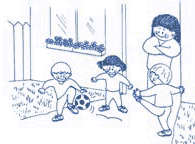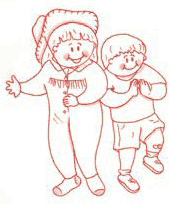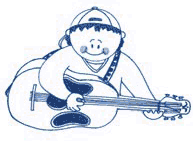|
Learning Activities for Preschoolers
What to expect:
Between their third and fourth birthdays, children

- Start to play with other children, instead of next to them;
- Are more likely to take turns and share and begin to understand that other people have feelings and rights;
- Are increasingly self-reliant and probably can dress with little help;
- May develop fears ("Mommy, there's a monster under my bed.") and have imaginary companions;
- Have greater large-muscle control than toddlers and love to run, skip, jump with both feet, catch a ball, climb downstairs and dance to music;
- Have greater small-muscle control than toddlers, which is reflected in their drawings and scribbles;
- Match and sort things that are alike and unalike;
- Recognize numerals;
- Like silly humor, riddles and practical jokes;
- Understand and follow spoken directions;
- Use new words and longer sentences;
- Are aware of rhyming sounds in words;
- May attempt to read, calling attention to themselves and showing pride in their accomplishment;
- Recognize print around them on signs or in logos;
- Know that each alphabet letter has a name and identify at least 10 alphabet letters, especially those in their own names; and
- "Write," or scribble messages.
Between their fourth and fifth birthdays, children

- Are active and have lots of energy and may be aggressive in their play;
- Enjoy more group activities, because they have longer attention spans;
- Like making faces and being silly;
- May form cliques with friends and may change friendships quickly;
- Have better muscle control in running, jumping and hopping;
- Recognize and write the numerals 1-10;
- Recognize shapes such as circles, squares, rectangles and triangles;
- Love to make rhymes, say nonsense words and tell jokes;
- Know and use words that are important to school work, such as the names for colors, shapes and numbers; know and use words that are important to daily life, such as street names and addresses;
- Know how books are held and read and follow print from left to right and from top to bottom of a page when listening to stories read aloud;
- Recognize the shapes and names of all letters of the alphabet and know the sounds of some letters; and
- Write some letters, particularly those in his own name.
What Preschoolers Need
3- to 4-year-old children require opportunities to

- Play with other children so they can learn to listen, take turns and share;
- Count and measure;
- Develop more physical coordination - for example, by hopping on both feet;
- Develop their growing language abilities through books, games, songs, science, math and art activities;
- Develop more self-reliance skills - for example, learning to dress and undress themselves;
- Participate actively with adults in reading-aloud activities;
- Explore the alphabet and print; and
- Attempt to write messages.
4- to 5-year-old children need opportunities to

- Experiment and discover, within limits;
- Develop their growing interest in school subjects, such as science, music, art and math;
- Enjoy activities that involve exploring and investigating;
- Group items that are similar (for example, by size, color or shape);
- Use their imaginations and curiosity;
- Develop their language skills by speaking and listening; and
- See how reading and writing are both enjoyable and useful (for example, by listening to stories and poems, seeing adults use books to find information and dictating stories to adults).
Learning Activities for Children:
|
|
|